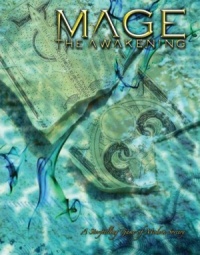Inscribe Grimoire
From Edge of Darkness Wiki
m (Text replace - "{{references}}{{footer" to "{{footer") |
Matrixchild (Talk | contribs) |
||
| (4 intermediate revisions not shown) | |||
| Line 18: | Line 18: | ||
Also, certain [[Mind]] spells or creatures can take knowledge from a mage’s mind, leaving a void in its place. In case rotes are lost in this way, it’s good to have them “backed up” in a book. | Also, certain [[Mind]] spells or creatures can take knowledge from a mage’s mind, leaving a void in its place. In case rotes are lost in this way, it’s good to have them “backed up” in a book. | ||
| - | The spell’s target number equals one success per Arcanum dot used in the rote to be recorded. For example, a [[Life]] {{dot3}}, [[Mind]] {{dot2}} rote requires five successes. The grimoire’s [[Duration]] is lasting; it cannot be dispelled and does not expire unless the grimoire itself is destroyed. Grimoires allow mages to learn their contents without requiring a teacher, although the experience point cost is the same. Additionally, the mage can cast a grimoire’s rotes even if he does not personally know the rotes, as long as he references the book during casting. Doing so requires one turn of reference, during which the mage can do nothing but read the book and move up to his Speed. In the following turn, he can cast the rote. If he is interrupted before casting, he must reference the book all over again. If he already knows the rote, referencing the grimoire gives a +1 bonus to casting it. | + | The spell’s target number equals one success per Arcanum dot used in the rote to be recorded. For example, a [[Life]] {{dot3}}, [[Mind]] {{dot2}} rote requires five successes. The grimoire’s [[Duration]] is lasting; it cannot be dispelled and does not expire unless the grimoire itself is destroyed. |
| + | |||
| + | ===Grimoires=== | ||
| + | |||
| + | Grimoires allow mages to learn their contents without requiring a teacher, although the experience point cost is the same. Additionally, the mage can cast a grimoire’s rotes even if he does not personally know the rotes, as long as he references the book during casting. Doing so requires one turn of reference, during which the mage can do nothing but read the book and move up to his Speed. In the following turn, he can cast the rote. If he is interrupted before casting, he must reference the book all over again. If he already knows the rote, referencing the grimoire gives a +1 bonus to casting it. | ||
Grimoires cannot be copied without going through the same spellcasting process used to create them. Only the original is enchanted; mundane copies produce only a mess of meaningless words. Despite the name, grimoires don’t have to be books. They can be computer programs or databases, or anything used to store knowledge. Sleepers cannot use grimoires. They cannot make sense of their contents, at least not on the esoteric level required. | Grimoires cannot be copied without going through the same spellcasting process used to create them. Only the original is enchanted; mundane copies produce only a mess of meaningless words. Despite the name, grimoires don’t have to be books. They can be computer programs or databases, or anything used to store knowledge. Sleepers cannot use grimoires. They cannot make sense of their contents, at least not on the esoteric level required. | ||
Latest revision as of 20:47, 5 April 2019
| ||||||||||||||||||||||
Facts about Inscribe GrimoireRDF feed
| Action | Extended + |
| Cost | None + |
| Mage | Spells + |
| Parent | Prime + |
| Pool | Intelligence +, Expression Skill +, and Prime + |
| Prime | 1 + |
| Rote | Silver Ladder + |
| Silver Ladder Rote | Inscribing the Ineffable Words + |
| Source | Mage The Awakening Sourcebook + |
| Spell Arcana | Prime + |
| Spell Aspect | Covert + |
| Spell Level | 1 + |
| Spell Practice | Compelling + |
